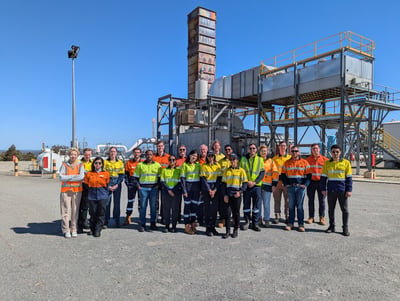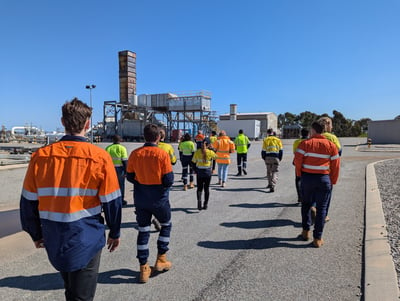As part of an ongoing commitment to upskilling and educating the next generation of pipeline professionals, the Young Pipeliners Forum (YPF) recently visited Compressor Station 9 (CS9) of the Dampier to Bunbury Natural Gas Pipeline (DBNGP). This visit offered a unique opportunity to learn firsthand about the complexities and operational nuances of one of Western Australia's critical gas infrastructure components.
CS9, the last station before the DBNGP reaches Perth, plays a vital role in ensuring uninterrupted gas supply to the metropolitan area. The day was filled with discussions led by industry experts Dave Saville and David Martin, who imparted valuable insights into various aspects of pipeline operations, maintenance, safety, and emergency response.
Key Learning Points:
- The Role of Compressor Stations A highlight of the visit was gaining a deeper understanding of compressor stations’ role in the pipeline network. As Dave explained, these stations increase gas pressure to mitigate the frictional losses that occur as gas travels through the pipeline. The group learned about the self-sufficiency of these stations, including how they generate their own power on-site and filter and sterilize bore water for use. This independence is crucial in remote locations and prevents depending on a third-party source.
- Gas Coolers and Stress-Corrosion Cracking An important aspect of maintaining pipeline integrity is managing the temperature increase caused by gas compression. The station's gas coolers mitigate this rise in temperature, mitigating a major factor in the formation of stress-corrosion cracking—a potentially catastrophic issue that can arise if heat isn't properly managed.
- Main Line Valves and Emergency Response The visit also provided valuable insights into the importance of main line valves. These valves are essential for isolating sections of the pipeline in the event of an emergency. The team discussed how these valves are maintained, operated, and used as part of the broader emergency response strategy. The discussion served as a reminder of the importance of preparedness and robust safety protocols in pipeline operations.
- The Pigging Program and Integrity Monitoring Another critical takeaway was the role of pipeline "pigs" in maintaining pipeline health. These devices are sent through the pipeline to clean and inspect for any issues, ensuring smooth operations and early detection of potential problems. The DBNGP’s pigging program, combined with technologies like Direct Current Voltage Gradient (DCVG) surveys, helps identify and address pipeline coating damage before it becomes a larger issue.
- Landowner Relations Maintaining good relations with landowners was a recurrent theme throughout the visit. The group discussed the importance of cooperation with those who own land adjacent to or over pipeline routes, particularly during construction or maintenance activities. This relationship is vital to ensuring seamless operations and addressing access issues, especially during emergency scenarios.
- Near Miss and Emergency Response Protocols One of the most impactful discussions was centred on a near-miss incident where coating damage was detected on the DBNGP, potentially caused by an excavator strike. The incident served as a case study in emergency response, highlighting the importance of implementing a temporary Maximum Operating Pressure (MOP) until the damage is assessed and evaluated, and addressing the challenges posed by environmental and land access constraints. This case also reinforced the importance of constant surveillance, pipeline signage, and adherence to emergency response procedures.
- Accommodation and Workforce Support Finally, the group touched on the need for accommodation at compressor stations. In remote areas, workers often need to stay on-site for extended periods, making facilities like gyms and accommodations not just a convenience but a necessity for health, safety, and well-being.


Final Thoughts
The YPF visit to CS9 was an eye-opening experience for all attendees. Through the expertise of Dave Saville and David Martin, the group gained valuable insights into the technical and operational challenges faced by the industry. The focus on safety, emergency preparedness, and constant innovation underscores the complexity of managing Australia’s gas pipeline infrastructure and highlights the critical role that young professionals will play in its future.
This visit was not only about understanding the technical aspects but also about recognizing the importance of collaboration, safety, and continued learning in this ever-evolving industry. As we look to the future, the lessons learned at CS9 will serve as a foundation for ensuring the resilience and reliability of our pipeline networks.
Special Mention
We extend our sincere thanks to Renee Dicks for her incredible efforts in organizing and facilitating the recent YPF visit to Compressor Station 9. Your dedication and attention to detail ensured a successful and insightful experience for all participants. The visit offered valuable learning opportunities and firsthand exposure to the critical operations of the station, greatly enriching our understanding of the pipeline industry.
We appreciate your hard work and commitment to supporting the development of the next generation of professionals in our field. Thank you, Renee!
